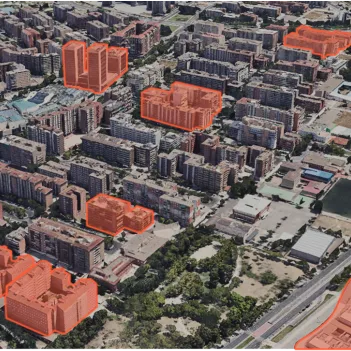DECUB
Decarbonizing Urban Blocks. An integrated approach for circular urban regeneration

- Category
- Project
- Call
- DUT Call 2023
- Duration
- –
- Project coordinator
- Universidad San Jorge
DECUB addresses the challenge of sustainable urban development and regeneration in European cities through a focus on the circular economy at the urban block level. The project aims to revitalize urban blocks by integrating strategies such as digital inventories and community engagement considerations.
The urban block level appears as a strategic scale of analysis and intervention in the view of adapting the built environment to expected net-zero emission targets, while maximizing reuse of on-site components and materials in deep renovation projects. Circularity at the urban block level allows testing scenarios, from soft renovation to deconstruction/reconstruction, considering location, risks, heritage, and adaptability.
DECUB acknowledges the need for developing specific methodological tools and frameworks to evaluate deep renovation strategies that include integrating life cycle analysis, material flow assessment, heritage values, environmental performance, and digital twins, aiming to advance the state of the art in the field.
DECUB identifies tangible and intangible values of the building block as a first step embedding circular economy practices in urban interventions. It considers environmental performance indicators, climate risk, the impact of urban block configuration on vulnerability, densification strategies, and community engagement, among others. This multidimensional approach highlights the need for tailored methodologies to accurately assess deep renovation strategies at the urban block level.
Urban Living Labs, involving local communities and stakeholders, act as real-world testbeds for experimenting with innovative solutions and co-creating sustainable urban spaces.
By leveraging multi-scale digital twins at the block level, DECUB explores varied interventions, ranging from soft renovation to deconstruction, tailored to each block's specific context.
These tools and methods directly support stakeholders by enabling simulation and evaluation of scenarios aimed at improving environmental performance in urban areas.
DECUB will deliver a comprehensive assessment framework to maximize material reuse and recycling, contributing to decarbonization and climate resilience in line with EU policies like the European Green Deal.
Its outcomes combine theoretical insights and practical tools: it advances understanding of digital twin technology in circular urban economies and integrates human-centric dimension into quantitative frameworks, while it provides open-source software to operationalize these theoretical insights. This twofold approach fosters reproducible research and enables application across public and private sectors.
Living Labs in diverse European cities will demonstrate tool implementation and support sustainable circularity strategies. A policy assessment method, grounded in empirical evidence, will further illustrate the applicability of tools and indicators, while reducing adoption barriers for stakeholders beyond the consortium and after the project completion. By selecting sites with broad representativeness and emphasizing standardization and adaptability, the project ensures relevance and expands its geographical impact and long-term value across Europe.
Belgium
France
The Netherlands
Spain
Geospatiumlab SL, Mines Paris - PSL, Université de Liège, Zuyd Hogeschool
Gemeente Heerlen, Sociedad Municipal Zaragoza Vivienda SL, SPI - Agence de développement territorial, Technische Universiteit Delft, Ville De Verviers
Contact
Ana Ruiz-Varona